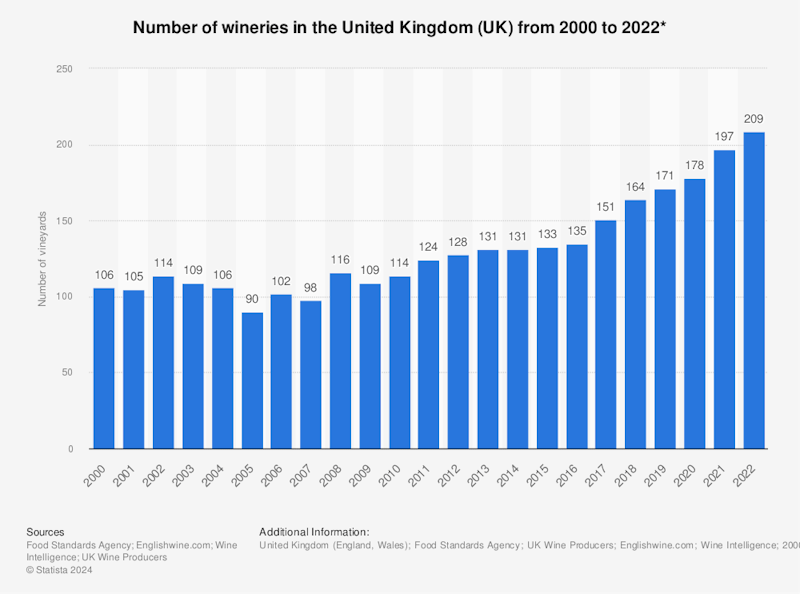Topic updates
The Renaissance of English Wine: An Economic Perspective

5th August 2024
Several news articles including this one from City AM have reflected recently that the English wine industry is experiencing an unexpected renaissance, with revenues soaring by 15% last year. This surge is driven by a combination of climate change, savvy investments, and innovative business practices. Despite still trailing behind global powerhouses like France, Italy, and Spain, the UK's wine output has skyrocketed, increasing by 77% last year to 161,960 hectolitres. This growth is epitomized by Kent-based Chapel Down, whose turnover jumped from £32m to £37m, a significant leap from the £13m recorded in 2018-19.

Climate Change: A Double-Edged Sword
One of the primary catalysts for this growth is the improving growing conditions in the UK due to climate change. Warmer temperatures have extended the growing season and improved grape yields. However, this same climate crisis threatens traditional wine-producing regions, prompting foreign investors to diversify their production into the UK.
James Simmonds from UHY Hacker Young highlights that investment in UK vineyards is partly driven by the desire to mitigate risks associated with climate-related crop failures in established wine regions. Notable investors like Michael Spencer and Nigel Wray have recognized the potential of English wine, funding expansions like Chapel Down's new £32m winery development in Canterbury.
Wine Tourism: A Lucrative Side Business
Turning a profit in the wine industry can be challenging, leading many producers to embrace wine tourism as a supplementary income source. Activities like vineyard tours, high-end dining experiences, and seasonal events attract diverse audiences and boost turnover. According to WineGB's 2024 survey, wine tourism now accounts for 25% of wineries' total income, with visitor numbers up by 55% since 2022.
Despite the booming English wine industry, the global fine wine market faces difficulties. The Liv-ex index of the top 100 fine wines fell by 3.4% in the first half of 2024, continuing a downward trend since late 2022. This decline contrasts sharply with the robust growth of English vineyards, suggesting a shifting landscape in the global wine economy.

Exam-Style Questions
- Discuss the impact of climate change on traditional and emerging wine-producing regions.
- How has climate change affected grape yields in traditional wine-producing countries?
- What opportunities has climate change created for English vineyards?
- Analyse the role of investment in the growth of the English wine industry.
- Who are some notable investors in the English wine sector?
- How has investment facilitated the expansion of English vineyards?
- Evaluate the economic significance of wine tourism for English vineyards.
- What strategies have vineyards employed to attract tourists?
- How does wine tourism contribute to the overall revenue of English wineries?
Glossary of Key Economic Terms
- Climate Change: Long-term alterations in temperature and weather patterns, often attributed to human activities, affecting agricultural productivity.
- Crop Yield: The total quantity of crops produced per unit of land area.
- Diversification: The process of a business expanding its range of products or markets to reduce risk.
- Fine Wine Market: A market segment dealing with high-quality, often rare and expensive wines, considered valuable investments.
- Hectolitre: A metric unit of volume equal to 100 liters, commonly used to measure wine production.
- Investment: The allocation of resources (capital) into a business with the expectation of generating profit.
- Revenue: The total income generated from the sale of goods or services before any expenses are deducted.
- Terroir: The set of environmental factors, including soil, climate, and topography, that influence the characteristics of wine.
Retrieval Questions
- By what percentage did English vineyards' revenues increase last year?
- How much did the UK's wine output rise last year in hectolitres?
- What is the main reason cited for improved growing conditions in the UK vineyards?
- Name two notable investors in the English wine industry mentioned in the article.
- What percentage of wineries' total income is now attributed to wine tourism, according to WineGB's 2024 survey?
- How much did Chapel Down's turnover increase from 2018-19 to last year?
- What is one challenge faced by traditional wine-producing regions due to climate change?

You might also like

Buns, Tax and Zero-Hours
29th August 2015
Analysis Diagram: Scale Economies and Profitability
Topic Videos
Free Range Milk and Profits in the Farming Industry
12th March 2017

The Planet's Biggest Baked Bean Factory
28th January 2018

Manchester introduces £1 a night tourist tax
31st March 2023
Daily Email Updates
Subscribe to our daily digest and get the day’s content delivered fresh to your inbox every morning at 7am.
Signup for emails